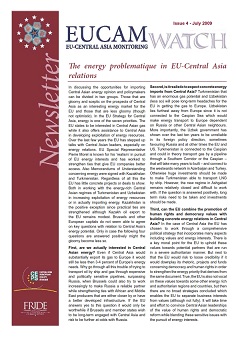The energy problematique in EU-Central Asia relations
The energy problematique in EU-Central Asia relations
Author(s): Jos Boonstra, Michael Denison, Vaclav Hubinger, Jacqueline Hale, Rainer Behnke, Natalia Mirimanova
Contributor(s): Jos Boonstra (Editor), Natalia Mirimanova (Editor), Nafisa Hasanova (Editor), Aigerim Duimagambetova (Editor), Anne Harrington (Editor)
Subject(s): Energy and Environmental Studies, Environmental and Energy policy, International relations/trade, EU-Approach / EU-Accession / EU-Development, Geopolitics, Transport / Logistics
Published by: CEPS Centre for European Policy Studies
Keywords: European Union; Central Asia; international relations; energy policy; gas; oil; energy resources; energy corridors; gas transport; international gas corridor;
Summary/Abstract: In discussing the opportunities for importing Central Asian energy opinion and policymakers can be divided in two groups. Those that are gloomy and sceptic on the prospects of Central Asia as an interesting energy market for the EU and those that are less gloomy (though not optimistic). In the EU Strategy for Central Asia, energy is one of the seven priorities. The EU states to be interested in Central Asian gas while it also offers assistance to Central Asia in developing exploitation of energy resources. Over the last few years the EU has stepped up talks with Central Asian leaders, especially on energy relations. EU Special Representative Pierre Morel is known for his ‘realism’ in pursuit of EU energy interests and has worked to strengthen ties that give EU companies better access. Also Memorandums of Understanding concerning energy were signed with Kazakhstan and Turkmenistan. Regardless of all this the EU has little concrete projects or deals to show. Both in working with the energy-rich Central Asian regimes of Turkmenistan and Uzbekistan in increasing exploitation of energy resources or in actually importing energy. Kazakhstan is the positive exception since practical ties are strengthened although Kazakh oil export to the EU remains modest. Brussels and other European capitals do not seem able to agree on key questions with relation to Central Asia’s energy potential. Only in case the following four questions are answered positively might the gloomy become less so.
Series: EUCAM Watch
- Page Count: 8
- Publication Year: 2009
- Language: English
- Content File-PDF

